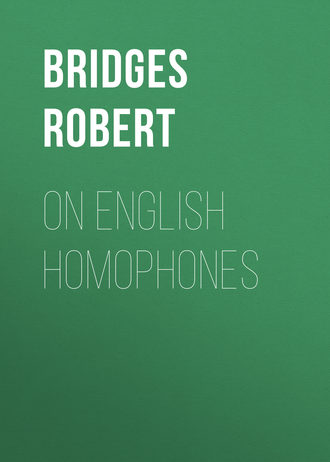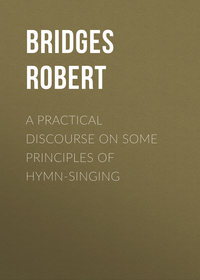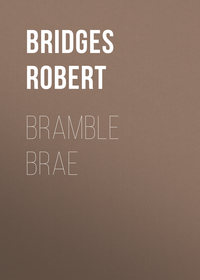 полная версия
полная версияOn English Homophones
room, rheum.
root, route.
rout, route (military).
sign, sine (trigonom.).
site, sight, cite.
size (magnitude), size (glue).
sough, sow.
sound (noise), sound (to fathom), sound (adj.), sound (strait of sea), sound (fish bladder).
sack (bag), sack (to plunder), sack (wine).
swallow (a willow), sallow (pale colour).
sap (of trees), sap (mine).
sum, some.
sun, son + sunny, sonnie.
sage (plant), sage (adj.).
sale, sail.
sell, cell.
sense, cense.
censual, sensual.
surge, serge.
surf, serf.
scent, cent, sent (fr. send).
session, cession.
sea, see.
seed, cede.
seal (animal), ciel or ceil, seal (sign).
seam, seem.
sear, sere, cere, seer.
serial, cereal.
signet, cygnet.
cist (box), cyst (tumour, Gr.).
scar (of wound), scar (a rock).
skull, scull.
scale (shell), scale (of balance), scale (of stairs).
scald (burn), skald (poet, Norse).
scrub (of shrubs), scrub (v.).
sledge (vehicle), sledge (-hammer).
slight, sleight.
slay, sleigh (sledge).
slate (s.), slate (v., abuse).
sloe, slow.
slop (puddle), slop (loose garment).
slot (track), slot (bar).
sole (adj.), soul, sole (a fish).
sow, sew.
saw (tool), soar, sore, saw (maxim), saw (fr. see).
soil (ground), soil (defile), soil (v., of horses).
spar (beam), spar (mineral), spar (to box).
salter (who salts), psalter.
source, sauce.
spell (incantation), spell (letters), spell (turn of work).
spill (upset), spill (match).
spit (v.), spit (roasting), spit (of land).
spray (drizzle), spray (= sprig).
spruce (tree), spruce (adj.)
style, stile.
stud (nail), stud (of horses).
stake (post), steak, stake (deposit).
step, steppe.
stair, stare.
stern (adj.), stern (of ship).
steal, steel, stele.
steep (adj.), steep (v.).
steer (direct), steer (young ox).
still (tranquil), still (distil).
stalk (stem), stalk (v.), stork.
story, storey.
strand (shore), strand (fibre).
strain (v. and s.), strain (a breed).
strait (narrow), straight (upright).
stroke (a blow), stroke (fondle).
stoup, stoop.
shed (scatter), shed (shelter).
tart (adj.), tart (a pie).
tyre (of wheel), tire (fatigue), tire (attire), + tier (who ties).
time, thyme.
tap (to strike), tap (short pipe).
tale, tail, tail (estate in t.).
tender (adj.), tender (s., attender).
tent (pavilion), tent (plug of lint, s. and v.), tent (wine).
tare, tear (v.).
teem, team.
tear (eye), tier.
tick (bedding), tick (sheep), tick (clock), tic (spasm), tick (credit).
till (cash drawer), till (until).
tilt (v., to make aslant), tilt (tourney), tilt (of caravan).
tip (top), tip (make to slant), tip (a gift).
toe, tow (hemp), tow (draw a boat).
two, too, to.
toll (lax), toll (of bells).
taut, taught, tort.
toil (labour), toil (a snare).
top (summit), top (a toy).
truck (vehicle), truck (naut.), truck (barter).
trump (trumpet), trump (at cards).
trunk (box), trunk (of tree), trunk (of elephant).
tray, trait.
trace (track), trace (strap).
chair, chare.
chap (crack), chap (chapman), chap (cheek).
char (burn), char (fish), char (-woman).
chop (with hatchet), chop (and change).
chuck (chick), chuck (strike gently).
chase (hunt), chase (enchase), chase (printer's case), chase (groove).
vice (depravity), vice (clench), vice (deputy).
valley, valet.
van (front of army), van (fan), van (caravan).
vale, vail, veil.
vain, vein, vane.
won, one.
wake (awake), wake (watch), wake (of ship).
wain, wane.
waste, waist.
wait, weight.
wave, waive.
well (good), well (spring).
wee, we.
weak, week.
ween, wean.
war, wore.
would, wood.
II. All the following examples involve wh. > w. 5
ware (earthen-), ware (aware), wear, where, were.
way, weigh, whey.
weal (wealth), weal (a swelling), wheel.
weald, wield, wheeled.
while, wile.
whine, wine,
white, wight.
whether, weather.
whither, wither.
whig, wig.
whit, wit.
what, wot.
whet, wet.
whirr, were = wer'.
whin, win.
whist, wist.
which, witch, wych (elm).
III. Group of Homophones caused by loss of trilled R. 6
ion, iron.
father, farther.
lava, larva.
halm, harm.
calve, carve.
talk, torque.
daw, door.
flaw, floor.
yaw, yore.
law, lore.
laud, lord.
maw, more,
gnaw, nor.
raw, roar.
shaw, shore.
IV. The name of a species (of animals, plants, &c.) is often a homophone. Where there is only one alternative meaning, this causes so little inconvenience that the following names (being in that condition) have been excluded from List I. 7
bleak (fish), bleak (adj.).
dace, dais.
gull (bird), gull (s. and v.).
carp, carp (v.).
cod, cod (husk).
codling, coddling (fr. coddle).
flounder (fish), flounder (v.).
quail (bird), quail (v.).
lark (bird), lark (fun).
ling (fish), ling (heather).
mussel, muscle.
nit, knit.
awk, orc.
oriole, aureole.
pike (fish), pike (weapon).
pout (fish), pout (v.).
perch (fish), perch (alight).
plaice, place.
ray (fish), ray (of light).
rook (bird), rook (v.).
skua, skewer.
skate (fish), skate (on ice).
smelt (fish), smelt (fr. smell).
swift (bird), swift (adj.).
swallow (bird), swallow (throat).
tapir, taper.
tern, turn.
teal (fish), teil (tree).
thrush (bird), thrush (disease).
V. The suffix er added to a root often makes homophones. The following are examples. (And see in List VI.)
byre, buyer (who buys).
butter (s.), butter (who butts).
better (adj.), better (who bets).
border, boarder.
dire, dyer.
founder (v.), founder (who founds).
geyser, gazer.
greater, grater (nutmeg).
canter (pace), canter (who cants).
medlar, meddler.
moulder (v.), moulder (who moulds).
pitcher (vessel), pitcher (who pitches).
pillar, piller.
platter, plaiter.
plumper (adj.), plumper (s.).
sounder (adj.), sounder (who sounds).
cellar, seller, &c.
VI. Words excluded from the main list for various reasons, their homophony being rightly questioned by many speakers
actor, acta (sanctorum).
brute, bruit.
direst, diarist.
descent, dissent.
deviser, divisor.
dual, duel.
goffer, golfer.
carrot, carat.
caudle, caudal.
choler, collar.
compliment, complement.
lumber, lumbar.
lesson, lessen.
literal, littoral.
marshal, martial.
minor, miner.
manor, manner.
medal, meddle.
metal, mettle.
missal, missel (thrush).
orphan, often.
putty, puttee.
pedal, peddle.
police, pelisse.
principal, principle.
profit, prophet.
rigour, rigger.
rancour, ranker.
succour, sucker.
sailor, sailer.
cellar, seller.
censor, censer.
surplus, surplice.
symbol, cymbal.
skip, skep.
tuber, tuba.
whirl, whorl.
wert, wort (herb, obs.).
vial, viol.
verdure, verger (in Jones).
VII. Homophones due only to an inflected form of a word. Comparatives of adjectives, &c
adze, adds.
art (s.), art (v.).
bard, barred.
band, banned.
battels, battles (bis).
baste, based.
baize, bays (bis).
bent, bent (pp. bend).
bean, been.
blue, blew.
bode, bowed.
bold, bowled, bolled (obs.).
bald, bawled.
braid, brayed.
bread, bred.
brood, brewed.
bruise, brews.
depose, dépôts.
divers (adj.), divers (plu.).
dug (teat), dug (fr. dig).
duct, ducked.
dust, dost.
daze, days.
daisies, dazes (both inflected).
doze, does (plu. of doe).
aloud, allowed.
fort, fought.
found (v.), found (fr. find)
phase, fays (pl. of fay).
felt (stuff), felt (fr. feel)
furze, firs, and furs.
feed (s. and v.), fee'd.
flatter (v.), flatter (adj.).
phlox, flocks.
phrase, frays.
guise, guys (plu.).
gaud, gored.
gauze, gores.
guest, guessed.
glose, glows.
ground (s.), ground (fr. grind).
graze, greys.
greaves, grieves.
groan, grown.
grocer, grosser.
hire, higher.
herd, heard.
hist, hissed.
hose, hoes.
hawse (naut.), haws, &c.
eaves, eves.
use (v.), ewes, yews.
candid, candied.
clove (s.), clove (fr. cleave).
clause, claws.
cold, coaled.
courser, coarser.
court, caught.
cause, cores, caws.
coir, coyer (fr. coy).
crew (s.), crew (fr. crow).
quartz, quarts.
lighter (s.), lighter (fr. light, adj.).
lax, lacks, &c.
lapse, laps, &c.
lade (v.), laid.
lane, lain.
lead (mineral), led.
left (adj.), left (fr. leave).
Lent, leant, lent (fr. lend).
least, leased.
lees (of wine), leas, &c.
lynx, links.
mind, mined.
madder (plant), madder (fr. mad).
mustard, mustered.
maid, made.
mist, missed.
mode, mowed.
moan, mown.
new, knew, &c.
nose, knows, noes.
aught (a whit), ought (fr. owe).
pact, packed.
paste, paced.
pervade, purveyed.
pyx, picks.
please, pleas.
pause, paws, pores.
pride, pried [bis].
prize, pries.
praise, prays, preys.
rouse, rows.
rasher (bacon), rasher (fr. rash).
raid, rayed.
red, read (p. of to read).
rex, wrecks, recks.
road, rode, rowed.
rote, wrote.
rove (v. of rover), rove (fr. reeve).
rose, rows (var.), roes (var.), rose (v.).
ruse, rues (fr. rue).
side, sighed.
size, sighs.
scene, seen.
seize, seas, sees.
sold, soled (both inflected).
sword, soared.
sort, sought.
span (length), span (fr. spin).
spoke (of wheel), spoke (fr. speak).
stole (s.), stole (fr. steal).
stove (s.), stove (fr. stave).
tide, tied.
tax, tacks (various).
tact, tacked.
tease, teas, tees.
toad, towed, toed.
told, tolled.
tract, tracked.
trust, trussed.
chaste, chased (various).
choose, chews.
throne, thrown.
through, threw.
wild, wiled.
wind (roll), whined.
wax, whacks.
wade, weighed.
weld, welled.
word, whirred.
wilt (wither), wilt (fr. will).
ward, warred.
wont, won't.
warn, worn.
VIII. 'False homophones' [see p. 4], doubtful doublets, &c
beam, beam (of light).
bit (horse), bit (piece), bit (fr. bite).
brace, brace.
diet, diet.
deck (cover), deck (adorn).
deal (various).
dram (drink), drachm.
drone (insect), drone (sound).
jest, gest (romance, and obs. senses).
jib (sail), jib (of horses).
fine (adj., v. senses), fine (mulct).
flower, flour.
fleet (s.), fleet (adj.), Fleet (stream).
grain (corn), grain (fibre).
indite, indict.
incense (v. =cense), incense (incite).
kind (adj.), kind (s.).
canvas, canvass.
cuff (sleeve), cuff (strife).
cousin, cozen.
cord, chord (music).
coin, coign.
cotton (s.), cotton (v.).
crank (s.), crank (adj.).
quaver (v.), quaver (music).
levy, levee.
litter (brood), litter (straw).
mantle (cloak), mantle (shelf).
mess (confusion), mess (table).
mussel, muscle.
nail (unguis), nail (clavus).
patent (open), patent (monopoly).
pommel (s.), pummel (v.).
refrain (v.), refrain (s., in verse).
retort (reply), retort (chemical vessel).
second (number), second (of time).
squall (v.), squall (a gale).
slab (s.), slab (adj.).
smart (s. and v., sting), smart (adj.).
stave (of barrel), stave (of music), [stave in (v.)].
stick (s.), stick (v.).
stock (stone), stock (in trade), &c.
strut (a support), strut (to walk).
share (division), share (plough).
sheet (sail and clew), sheet (-anchor).
shear (clip), sheer (clear), sheer off (deviate).
tack (various), tack (naut.).
ton, tun.
wage (earnings), wage (of war).
IX. The following words were not admitted into the main class chiefly on account of their unimportance
ah! are.
arse, ass.
ask, aske (newt)
ayah, ire.
bah! bar, baa.
barb, barb (horse).
bask, basque.
barn, barne = bairn.
budge, budge (stuff).
buff, buff.
buffer, buffer.
berg, burgh (suffixes).
bin, bin = been.
broke (v. of broke), broke (fr. break).
broom, brume (fog).
darn, darn.
fizz, phiz.
few, feu.
forty, forte.
hay, heigh!
hem (sew), hem (v., haw).
hollow, hollo (v.).
inn, in.
yawl (boat), yawl (howl).
coup, coo.
lamb, lam (bang).
loaf, loaf (v. laufen).
marry! marry (v.).
nag (pony), nag (to gnaw), knag.
nap (of cloth), nap (sleep).
nay, neigh.
oh! owe.
ode, owed.
oxide, ox-eyed.
pax, packs.
pants, pants (fr. pant).
prose, pros (and cons).
sink (var.), cinque.
swayed, suede (kid).
ternary, turnery.
tea, tee (starting point).
taw (to dress skins), taw (game, marbles), tore (fr. tear).
cheap, cheep.
tool, tulle,
we! woe.
ho! hoe.
The facts of the case being now sufficiently supplied by the above list, I will put my attitude towards those facts in a logical sequence under separate statements, which thus isolated will, if examined one by one, avoid the confusion that their interdependence might otherwise occasion. The sequence is thus:
1. Homophones are a nuisance.
2. They are exceptionally frequent in English.
3. They are self-destructive, and tend to become obsolete.
4. This loss impoverishes the language.
5. This impoverishment is now proceeding owing to the prevalence of the Southern English standard of speech.
6. The mischief is being worsened and propagated by the phoneticians.
7. The Southern English dialect has no claim to exclusive preference.
1. That homophones are a nuisanceAn objector who should plead that homophones are not a nuisance might allege the longevity of the Chinese language, composed, I believe, chiefly of homophones distinguished from each other by an accentuation which must be delicate difficult and precarious. I remember that Max Müller [1864] instanced a fictitious sentence
ba bà bâ bá,
'which (he wrote) is said to mean if properly accented The three ladies gave a box on the ear to the favourite of the princess.' This suggests that the bleating of sheep may have a richer significance than we are accustomed to suppose; and it may perhaps illustrate the origin as well as the decay of human speech. The only question that it raises for us is the possibility of distinguishing our own homophones by accentuation or by slight differentiation of vowels; and this may prove to be in some cases the practical solution, but it is not now the point in discussion, for no one will deny that such delicate distinctions are both inconvenient and dangerous, and should only be adopted if forced upon us. I shall assume that common sense and universal experience exonerate me from wasting words on the proof that homophones are mischievous, and I will give my one example in a note8; but it is a fit place for some general remarks.
The objections to homophones are of two kinds, either scientific and utilitarian, or æsthetic. The utilitarian objections are manifest, and since confusion of words is not confined to homophones, the practical inconvenience that is sometimes occasioned by slight similarities may properly be alleged to illustrate and enforce the argument. I will give only one example.
Utilitarian objections not confined to homophones.
The telephone, which seems to lower the value of differentiating consonants, has revealed unsuspected likenesses. For instance the ciphers, if written somewhat phonetically as usually pronounced, are thus:

by which it will be seen that the ten names contain eight but only eight different vowels, 0 and 4 having the same vowel aw, while 5 and 9 have ai. Both these pairs caused confusion; the first of them was cured by substituting the name of the letter O for the name of the zero cipher, which happens to be identical with it in form,9 and this introduced a ninth vowel sound ou (= owe), but the other pair remained such a constant source of error, that persons who had their house put on the general telephonic system would request the Post Office to give them a number that did not contain a 9 or a 5; and it is pretty certain that had not the system of automatic dialling, which was invented for quite another purpose, got rid of the trouble, one of these two ciphers would have changed its name at the Post Office.
Æsthetic objections.
In the effect of uniformity it may be said that utilitarian and æsthetic considerations are generally at one; and this blank statement must here suffice, for the principle could not be briefly dealt with: but it follows from it that the proper æsthetic objections to homophones are never clearly separable from the scientific. I submit the following considerations. Any one who seriously attempts to write well-sounding English will be aware how delicately sensitive our ear is to the repetition of sounds. He will often have found it necessary to change some unimportant word because its accented vowel recalled and jarred with another which was perhaps as far as two or three lines removed from it: nor does there seem to be any rule for this, since apparently similar repetitions do not always offend, and may even be agreeable. The relation of the sound to the meaning is indefinable, but in homophones it is blatant; for instance the common expression It is well could not be used in a paragraph where the word well (= well-spring) had occurred. Now, this being so, it is very inconvenient to find the omnipresent words no and know excluding each other: and the same is true of sea and see; if you are writing of the sea then the verb to see is forbidden, or at least needs some handling.
I see the deep's untrampled floor
With green and purple seaweeds strewn:
here seaweeds is risky, but I see the sea's untrampled floor would have been impossible: even the familiar
The sea saw that and fled
is almost comical, especially because 'sea saw' has a most compromising joint-tenant in the children's rocking game
See saw Margery daw.
The awkwardness of these English homophones is much increased by the absence of inflection, and I suppose it was the richness of their inflections which made the Greeks so indifferent (apparently) to syllabic recurrences that displease us: moreover, the likeness in sound between their similar syllables was much obscured by a verbal accent which respected the inflection and disregarded the stem, whereas our accent is generally faithful to the root.10 This sensitiveness to the sound of syllables is of the essence of our best English, and where the effect is most magical in our great poets it is impossible to analyse.
Once become sensible of such beauty, and of the force of sounds, a writer will find himself in trouble with no and know. These omnipresent words are each of them essentially weakened by the existence of the other, while their proximity in a sentence is now damaging. It is a misfortune that our Southern dialect should have parted entirely with all the original differentiation between them; for after the distinctive k of the verb was dropped, the negative still preserved (as it in some dialects still preserves) its broad open vowel, more like law than toe or beau, and unless that be restored I should judge that the verb to know is doomed. The third person singular of its present tense is nose, and its past tense is new, and the whole inconvenience is too radical and perpetual to be received all over the world. We have an occasional escape by using nay for no, since its homophone neigh is an unlikely neighbour; but that can serve only in one limited use of the word, and is no solution.




